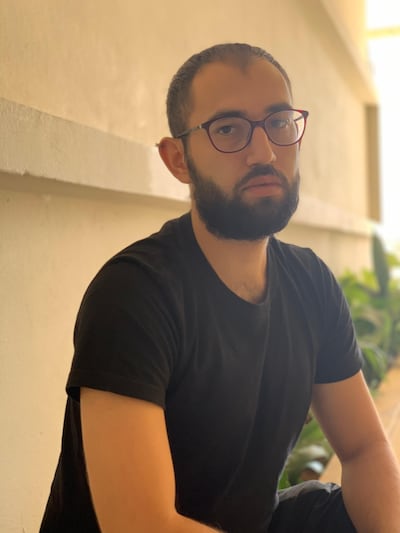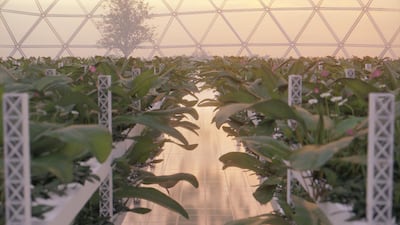Sometime in the distant future, Earth's inhabitants have moved into space colonies as the erratic and devastating effects of climate change take over the planet. Inside one colony, two individuals contemplate what it means to live under such conditions, where life cycles seem extremely controlled. This is the premise of Nadim Choufi's film project, The Sky Oscillates Between Eternity and Its Immediate Consequences.
On Tuesday, October 6, the Lebanese artist, who lives in Beirut, was awarded Art Jameel’s special commission for digital art. In the wake of the pandemic, the 2020 accolade changed its focus from drawing and painting to digital art earlier this year. It was also developed as a means to provide support for artists to continue production despite the temporary closures of institutions.
This year’s theme focused on the notion of time, and how it has been reshaped not just by the current crisis, but also by modern technology.
Choufi was selected from an online open call that received 200 submissions, with his win bestowed by a jury of artists and curators, including Nadim Samman of KW Institute for Contemporary Art in Berlin and Ben Vickers of the Serpentine Galleries, London.
The jury has also awarded honourable mentions to two applicants, German-Iraqi artist Nora Al Badri for her work Neuronal Ancestral Sculptures Series and Lebanese duo Edwin Nasr and Bassem Saad for the research project Wound Contra Empire.
The Sky Oscillates Between Eternity and Its Immediate Consequences features animations of digital renders of the space colony's interiors and the desert that surrounds it. In developing his concept and writing the script for his film, Choufi says he researched the growth of smart cities and futuristic plans around interplanetary existence.
"The work is specifically looking at the end of cities, or a city during a crisis. I was also looking at these space colonies that are popping up around the world; even Dubai is constructing one of these colonies in the middle of the desert," he says. The artist is referring to the MBR Space Settlement Challenge supported by the Dubai Future Foundation, which is geared towards creating long-term space settlements on Mars in 2117.
Choufi’s concerns are not purely scientific but, rather, more centred on the human experience of such a future. His questions revolve around the development of social organisation within these colonies and how, as an artist, he can imagine lived experiences inside them. One narrator, for example, thinks about how they are “living fossils”, essentially trapped under dome structures, where new species can be introduced and the population never fluctuates.
“The second exploration is about how cities right now operate by trying to consume everything and contain everything within the city instead of being fluid,” he says, referring to the phenomena of urban sprawl and the expansion of cities around the world.

His space colonies go in another direction – sealing off populations under the dome. “The domes have a closed space as an environment, which is also problematic because you’re being selective about who gets to be inside these domes instead of trying to solve a planetary problem,” he explains. Choufi is tapping into the potential ethical considerations the world may face as climate change instigates issues, including climate refugees.
By winning the commission, the 26-year-old artist will receive an artist’s fee of $7,500, as well as a production budget for his project. Choufi is currently working with a team of five, including animator Mario Hawat and editor Antony Maalouf, to complete his work. It will be part of Art Jameel’s collection and will be shown online in early 2021.
Born in Abu Dhabi, Choufi spent his teenage years in the UAE before leaving to study abroad. He was a 2018-2019 fellow at Ashkal Alwan in Beirut and has shown his work at Sharjah Art Foundation, South Hill Parks Art Centre in the UK and The New School in the US.




